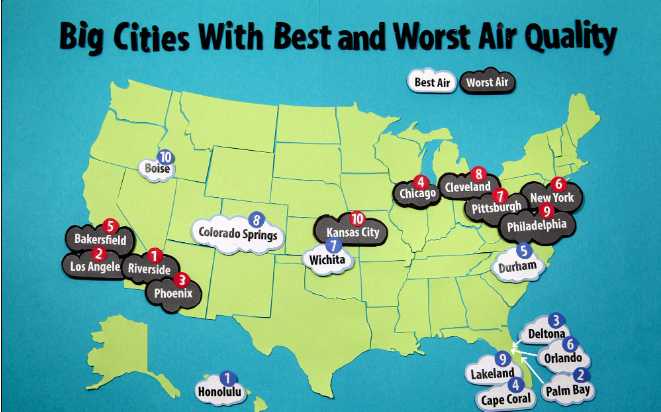In 2023, sixty-six million tons of pollution in the United States was released into the atmosphere (Environmental Protection Agency). Imagine eleven million full grown male elephants, each weighing around six tons, and you have a general picture of how much pollution was absorbed into our ozone layer, just last year alone. With climate change on the rise, air pollution is definitely one of the largest concerns. The air pollutants released by smoke, smog, and fumes wind up in the atmosphere, thus adding to the accumulation of particulate pollution that we eventually breathe into our lungs.
First off, we should address what creates poor air quality and why we should be concerned about it in the first place. According to the National Institute of Environmental Health Sciences, “Air pollution is a mix of hazardous substances from both human-made and natural sources” (National Institute of Environmental Health Sciences). This can be exhaust from manufacturing plants, fumes from highway emissions, wildfire smoke, and methane gas release, all of which are emitted into the atmosphere, therefore causing global warming.
Have you ever heard of the saying, “trees are the lungs of the earth?” This is especially important in the discussion of climate change, because if the particle pollution in the air is warming the atmosphere, then there are going to be more droughts and less rain, meaning it is dangerously easy to start a wildfire, burning down the trees that are there to absorb the air pollution in the first place. It’s a vicious cycle that will end up leading us to the gradual (or not so gradual) decline in our planet’s health. One of the first steps we as a society can take to become more aware of how climate change can affect us as a whole is becoming more aware of air pollution and air quality indexes. The World Health Organization states, “[By] [r]educing emissions of greenhouse gases through better transport, food and energy use choices can result in very large gains for health, particularly through reduced air pollution” (WHO), which shows how we can start to improve our planet’s health.
It’s hard to feel the need to pay attention to the air quality index sometimes, especially when the weather outside is sunny and the sky is blue, but a lot of air pollution is not able to be seen by the human eye and can easily be ignored. Why should your day be ruined by notifications of poor air quality on your weather app? However, air quality indexes are important measurements of the amount of particulate pollution in the air and whether or not you should be more careful outside if it’s higher than normal. And for good reason: prolonged exposure to bad air quality can affect people with sensitive immune systems, like people with asthma or the elderly. Even if the air quality index reads “unhealthy” or “hazardous”, anyone can be affected if exposed to the particulate matter in the air that can cause long term issues such as heart disease and pneumonia. This ties into the the results of our actions as a civilization, letting our waste start to turn on us and create more havoc to nature than we could have expected.
Wondering what my peers thought of the rising air quality concerns, especially since the Canadian forest fires last June, which brought an orange sky and the heavy smell of smoke to the air, I interviewed one of my fellow classmates, Seren, to see what her perspective was on the matter. “I think cautionary measures should be taken even before the air quality reaches bad measures,” she said after I asked her if cautionary measures should be taken when the AQI is unnaturally high. “Like we saw how long it took for us to get back to normal after the Canadian fires last June, so that should demonstrate enough of how much we need to change [our thinking] on that.” This perspective is important because it shows how our society is slowly getting smarter about air quality and how humanity can affect our environment in a negative way if we aren’t careful.
To sum up, is poor air quality a high enough concern to our society? Science research points to yes, and is already spreading the awareness of how air pollution affects air quality. The rise in poor air quality will be a greater concern as the years pass, and education on the topic will only become more crucial as society advances. If society is not educated on how our actions affect the environment, both in a positive and negative way, climate change problems will increase. However, if we become more aware of how we impact the biosphere we live in, we are one step closer to slowing down the effects of climate change. Air quality is only one piece to the puzzle, but it’s important in growing our awareness of how our actions can affect our world.
Categories:
Why You Should Pay Attention to Air Quality
Layli Graham, Staff Writer
September 27, 2024
1
More to Discover
About the Contributor

Layli Graham, staff writer
Layli Graham is currently a junior at Quakertown High School, and this is her first semester as a
Paw Prints staff writer. Layli’s interests include writing, art, playing various instruments, chess,
spending time with her family, and being a high school marching band member. This year,
her goals include balancing her schedule and trying her hand at journalism for the first time. She
is looking forward to what this year will bring!
Paw Prints staff writer. Layli’s interests include writing, art, playing various instruments, chess,
spending time with her family, and being a high school marching band member. This year,
her goals include balancing her schedule and trying her hand at journalism for the first time. She
is looking forward to what this year will bring!









